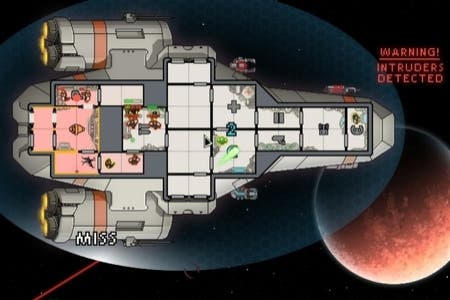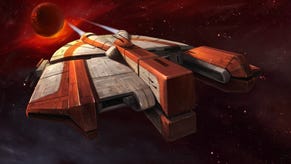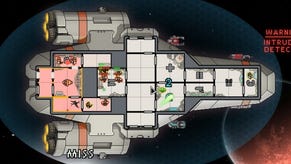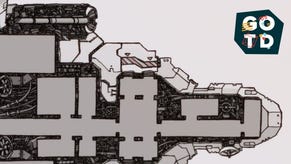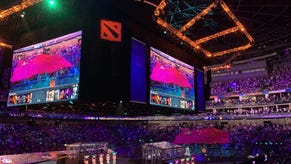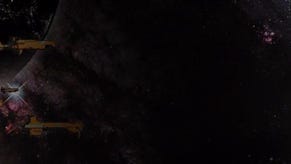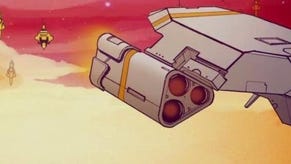FTL: Faster Than Light review
Friend or photon?
It's not often you can point to an indie game as the perfect illustration of a core scientific concept, but here we are. Einstein's theory of relativity lays bare the relationship between space and time. They're essentially aspects of the same thing - spacetime - and as you travel through space at the speed of light, time flows very differently than it does for the people you've left behind. At light speed, a journey that may take a few hours for you would be years for everyone else.
So it is with FTL, a superb little space-faring roguelike. Time spent in Faster Than Light does not equal the time passing in the world outside. What felt like a quick 30-minute game before going to bed turns out to have been an epic four-hour session that has left you cold and alone in the early hours of the morning.
Yes, it's one of those games. Games that swallow up your free time like a black hole swallows everything around it. And it's wonderful.
Developed by the two-man team of Subset Games, it's a simple yet nimble creation that creates bite-sized scenarios on the fly that will unite Star Trek and Star Wars fans in swooning joy. You're the captain of a Federation starship. You're on the run from vicious Rebels who are sweeping through the galaxy. You've got to deliver important data to the rest of the Federation fleet to turn the tide of the final battle. That's it.
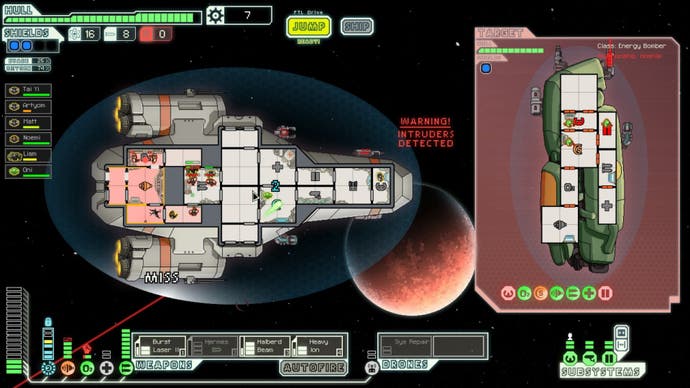
You do this by hopping across eight sectors of space, each containing a randomly generated sprawl of planets and stars. Visiting these triggers an equally random encounter - you may be attacked by pirates, approached by traders or asked for help. It's up to you how you respond. The game has no interest in morality or tracking your decisions. It's all about the onward journey.
Pushing you forward on this journey is the approaching Rebel fleet, which appears at the left of the map and advances with every turn. If you don't stay ahead of them, you're toast.
This simple mechanism supplies both the urgency of the game and the balance. If you were free to roam, there'd be very little challenge - you could skip from one star to another, amassing a huge arsenal of weapons, gathering a large crew and stockpiling missiles, fuel and the game's scrap metal currency without restriction. By forcing you to keep moving, every choice becomes fraught.
Do you risk a last minute jaunt back to a trading post for desperately needed fuel, risking capture in the process, or do you press on and hope that another store presents itself in the next sector? Do you respond to a distress call, knowing that you need to repair your hull, in the hope of earning some useful loot, or do you play it cold and leave the innocents to fend for themselves?
It's a role-playing game in many ways, albeit one without the guide ropes that most modern examples of that genre provide. You're the one issuing the orders. You're Captain Kirk, switching more power to the shields. You're Han Solo, jerry-rigging your battle-damaged hulk with whatever bits you can find. You're Adama, battling for the survival of the human race itself.
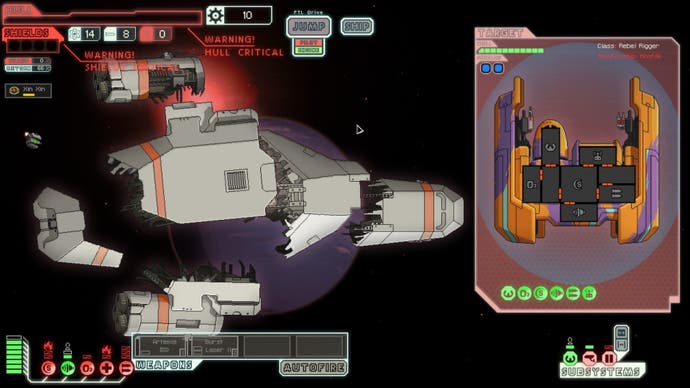
Combat is a tactical challenge rather than a visceral one. You're able to target specific systems on enemy vessels, and since most have shields, you'll want to take those out first - either with your limited stock of missiles or a disruptive ion weapon. But then what? Cripple the weapons? Damage the engines? Target their life support systems and let them slowly suffocate? Or beam over some crew members and rip things apart from the inside? They'll be doing the same to you, so the ability to quickly pause the game, respond to immediate threats then start again really helps. Weapons can also be set to auto-fire on their chosen target, leaving you free to put out fires or deal with intruders.
While the leapfrogging through space gives FTL its moreish structure, with no encounter lasting longer than a few minutes, it's the management of your starship that provides the gravitational pull that draws you in for hours at a time.
There are a multitude of overlapping systems, each providing benefits depending on how you play and what you encounter. Key systems can be enhanced by having a crew member man the relevant station. Having someone in the pilot's chair and someone else looking after the engines means you can evade incoming fire more effectively. Weapons and shields recharge faster with somebody watching over them.
But there's also the ship's oxygen supply, the control room that looks after the remote drones you can buy or collect, the medbay that heals wounded crew members and even the doors - those ssshhhhhfffffing sci-fi icons that can mean the difference between invaders or fires being contained or allowed to spread through the ship.
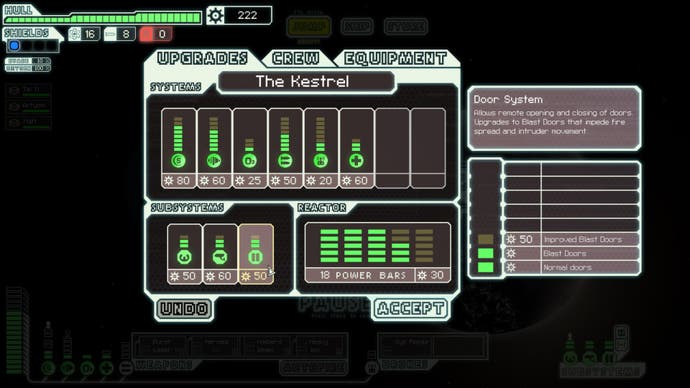
All of these things need power, and all can be upgraded using scrap. The ship has a core pool of energy from which to draw, with each system needing its own share of that power. This means that improving your ship requires no small amount of forward planning. Yes, you can buy an amazing beam laser that will cut through pirate hulls in seconds, but you'll need to upgrade your weapons systems to provide enough power to it, and then upgrade your central energy reserve to supply that power. It's never as simple as just slapping things in place.
What is simple is how all of these decisions are made. The on-screen info is concise and clear, and interaction is never anything more complex than a left or right mouse click. Left click to add power, right click to take it away. Left click to select a crew member, right click to tell them where to go. It's ingenious design, taking complex overlapping gameplay mechanics and then making them incredibly accessible and easy to play around with.
The crisp, chunky visual style also benefits the game in this regard, with a pixellated top-down view that is as charming as it is helpful. Retro without being ironic, it calls to mind beloved classics like Star Trek 25th Anniversary and Laser Squad, providing just enough lovely detail - such as the tiny but distinctive alien races - while still allowing your imagination to do most of the fun stuff.
And imagination, more than anything, is what FTL aims to tickle. The game's random nature ensures that while there's a singular objective in your sights, all the way at the other side of the sector map, what you're really doing is telling a new story every time. It's the very definition of a game that is all about the journey rather than the destination. One game might end with your last remaining crew member bravely holding the ship together as he limps from planet to planet, looking for salvation that never comes. Another might find you armed to the teeth and dominating the map, only to go down in a nail-biting tactical battle against an equally seasoned enemy.
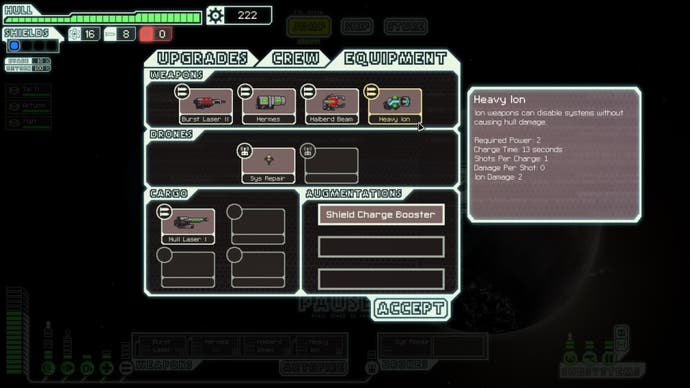
What is unlikely to happen is for you to reach the end and emerge victorious. FTL is a tough game, but one that never feels unduly punishing. Progress is fast enough - and enjoyable enough - that even after a crushing defeat right at the finish line, you'll still find your mouse clicking on New Game before the debris of your previous ship has drifted into the inky blackness.
The game's random nature can mean that such defeats feel unfair, as it can be easy to find yourself in a seemingly impossible situation through sheer bad luck. It's a testament to Subset's clarity of intent that such fleeting frustrations don't marr the overall experience. It's just how that particular story ended. The next one, you're always aware, will be completely different.
Or at least mostly different. FTL's other minor failing is how quickly certain encounter types start to repeat. There are lots of pieces and the game shuffles them well, but given how quickly you'll churn through games, and how likely it is that you'll spend hours at a time playing through over and over, repetition does become a problem. The first time you respond to an infestation of space spiders on a remote outpost, it's a giddy sci-fi thrill. By the tenth time that scenario has popped out from the game's invisible card deck, you'll be less enamoured of it.
Such foibles are easy to forgive, however, given how much depth and entertainment is conjured from such a simple setting. It would be easy to fill another thousand words with explanations of how intricately the game's ideas mesh together - the way crew members of different alien races open up new options, for example - but the appeal comes from discovering such delights for yourself as tiny plot twists in your 37th desktop epic of the day.
A lot of attention has been lavished on Kickstarter-funded games, usually favouring the larger studios that have parlayed their fanbases into some crowd-sourced dream project. FTL represents the grass roots approach that Kickstarter was supposed to support. Two guys with an idea went looking for 10,000 dollars, and ended up with 20 times that amount. That the windfall didn't result in a bloated indulgence speaks highly of Subset's focus. If they can keep updating FTL with new scenarios, new spaceships and new stories with the same intelligence and restraint, we could well be seeing the birth of a future classic.
